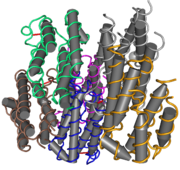Interferons are a group of signalling proteins released by host cells in response to viruses and other pathogens. They belong to a large class of proteins known as cytokines: molecules used for communication between cells to trigger the protective defences of the immune system that help to eradicate pathogens. More than twenty distinct interferon genes and proteins have been identified in animals, including humans.
When a cell is infected by a virus, several virus products, including glycoproteins and viral RNA, stimulate the cell to produce and release interferons. This causes nearby cells to heighten their defences against viral infection, and so interferes with viral replication. Some viruses, including Japanese encephalitis virus, dengue type 2 virus, human cytomegalovirus and Kaposi's sarcoma-associated herpesvirus, have evolved ways to resist interferon's antiviral activity. Interferons also have various other functions in regulating the immune system. Interferons and other cytokines are responsible for some symptoms of infection, such as fever, muscle pain and "flu-like symptoms".
